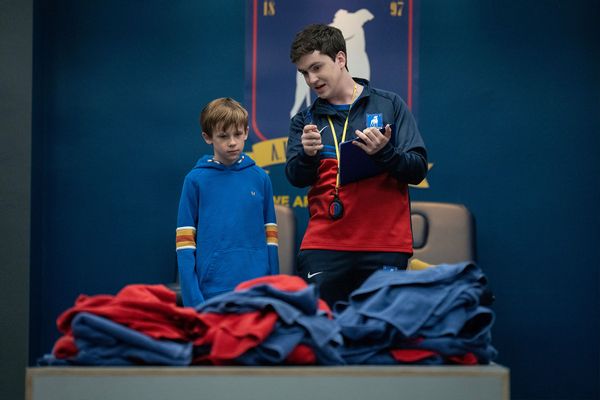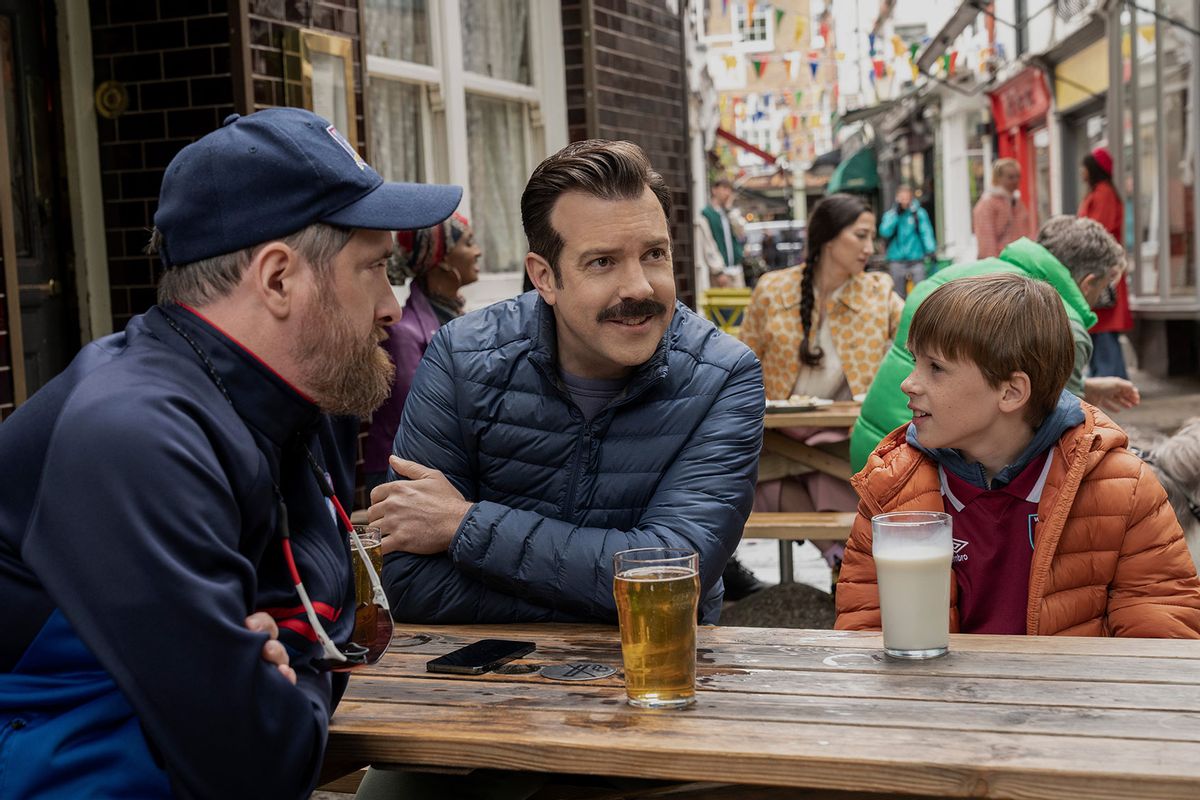From the beginning, buskers have been a big part of "Ted Lasso." Street (and real-life) musician Cam Cole had a reccurring role on the Apple TV+ series, including taking over as a big benefit performer and getting everyone on their feet with his weird one-man band. In the most recent episode, Ted (Jason Sudeikis), Beard (Brendan Hunt) and Ted's son Henry (Gus Turner) are treated to a rendition of "Hey Jude" by a busker (Alex Vargas) while dining outside at the local, Richmond supporters' pub. While Ted, preoccupied all episode by the fact that his ex-wife Michelle (Andrea Anders) may be moving on, takes a call, Beard explains the genesis of the song to young Henry.
"Hey Jude," released as a non-album single by the Beatles in 1968, was written by Paul McCartney to comfort John Lennon's son, Julian. The original title of the song was "Hey Jules," for Julian. John was separating from his then-wife and Julian's mother Cynthia due to his affair with Yoko Ono. Julian was 5 years old at the time, and the song was apparently composed while Paul drove down to visit the child. "I knew it was not going to be easy for him," Paul said, as quoted in the book "Paul McCartney: Many Years from Now," written by Barry Miles.
Their singing started back in 1969, a mere year after the song's release, thanks to a stadium announcer.
It's a fitting song for "Ted Lasso," which has been so much about Ted's divorce, especially this season. Henry seems mostly unconcerned about his mom's new romantic partner, but Beard uses a moment alone with the boy to impart some beardy wisdom, relevant to the child's life. He explains about Lennon's divorce and his son. "Jude's dad had a best friend . . . real worried about Jude and all his sad feelings," Beard says. "So, he wrote him this song, hoping that, well, the words might help him somewhere down the line." Henry accepts the advice, casting a long look at his dad on a park bench, and the two return to their French fries.
Surprisingly in a soccer show, no one mentions the other, extremely relevant history of the song. "Hey Jude" is an English football chant, beloved by massive crowds at sporting events, and part of a long and emotional tradition of singing along.
"Hey Jude, don't make it bad. / Take a sad song and make it better." These lyrics of the Beatles' classic seem like they could fit easily into a high-stakes game, where emotions run high and an evening can be ruined by a crushing loss, out of supporters' control. But the story is deeper than that. Brentford fans sing the song, sometimes replacing the "Hey Jude" of the chorus with "Brent-ford."
Their singing started back in 1969, a mere year after the song's release, thanks to their stadium announcer, Peter Gilham, known as Mr. Brentford. In his mid-70s, he's still working, the longest serving PA announcer in the United Kingdom. In 1969, it was his first year. He told The Athletic, "In those days, I would sit in a box at the back of the stand (at Griffin Park), make an announcement and put the music on as well. During the 1970s, there was a group of us who would socialize and go to home and away games. One of them was a girl called Judy Kaufman. Judy was known as Jude and therefore I used to play the song for her." Kaufman, a former teacher, died in 2019.
 Gus Turner and Charlie Hiscock in "Ted Lasso" (Apple TV+)Supporters of Manchester City also sing the song and have since the late 1960s. In 1968, Man City won their second first division title. According to Manchester Evening News, "'Hey Jude' was also released that year and it soon became associated with City's most successful era at the time and it has stuck around since."
Gus Turner and Charlie Hiscock in "Ted Lasso" (Apple TV+)Supporters of Manchester City also sing the song and have since the late 1960s. In 1968, Man City won their second first division title. According to Manchester Evening News, "'Hey Jude' was also released that year and it soon became associated with City's most successful era at the time and it has stuck around since."
If you've never seen big, sometimes shirtless, often inebriated British men singing with their entire bodies, fists pumping in the air, tears rolling down their faces, do yourself that favor.
"Hey Jude" works so well for huge groups to sing together because the chorus is soaring, memorable and easy to sing. There aren't any words to remember, for one thing. As Manchester Evening News describes it, "It also helps that the recognizable chorus of 'Nahh, na, na, nahh-na-na, nahh hey Jude,' can easily be changed to add any two syllable word or phrase at the end," adapting it for Man City, Brentford or others. And it sounds great reverberating through a huge stadium. "Do you know what the best part about this song is?" Beard asks Henry right before the busker hits a high note and prepares to launch into the chorus, backed by a gathering crowd. "This!"
But songs don't have to be easy for fans to sing them. Perhaps one notable difference between British and American sports fans at events? British supporters — they can really sing. They go for it, belting out entire songs, not just the shortened chorus. If you've never seen big, sometimes shirtless, often inebriated British men singing with their entire bodies, fists pumping in the air, tears rolling down their faces, do yourself a favor and lose an hour on YouTube that way. Singing is emotional. Sports can be emotional, and British soccer supporters bridge that gap. Fans use songs to motivate the players. Stadiums use music to motivate the fans. It brings people together, sometimes even across team lines.
Perhaps the best example of a song connecting at a match is "Don't Look Back in Anger," the Oasis song. Performed at the Stade de France when the French played a friendly match with England in 2017 mere days after the London and Manchester terrorism attacks left 22 people dead, both teams wore black armbands. And by the time of the first chorus of the melodic, emotional song, whose lyrics include the lines "Her soul slides away. / But don't look back in anger," the entire stadium was singing together, joined in support.
Want a daily wrap-up of all the news and commentary Salon has to offer? Subscribe to our morning newsletter, Crash Course.
Music can help heal, among its many properties, as (David Bowie fan) Beard well knows. And as stadium announcer Gilham told The Athletic, "Every fan knows they have a part to play . . . It sends shivers down your back when you hear Brentford supporters singing . . . It's a special moment and the fans wait to hear those first notes."



Shares